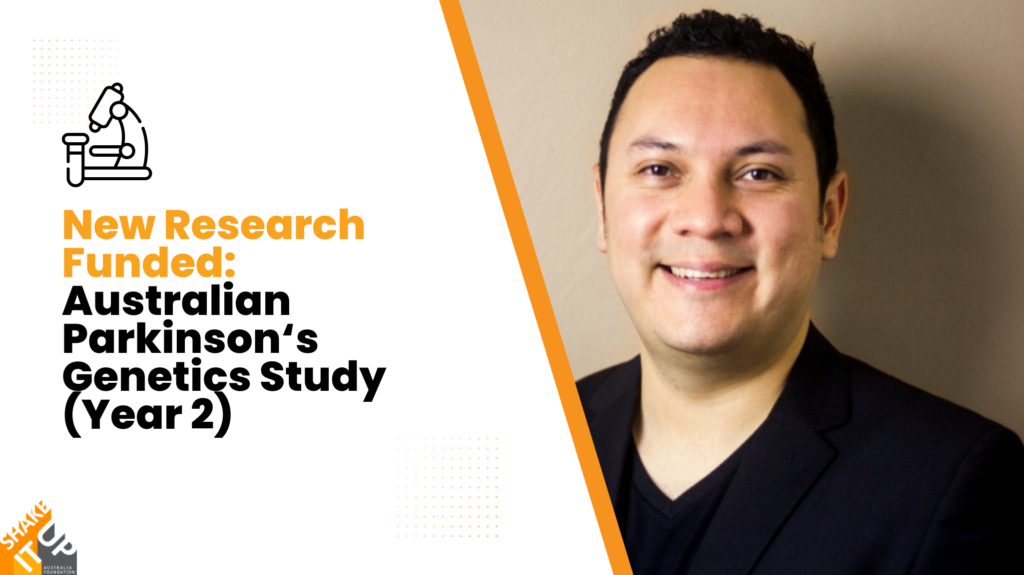
Earlier this month, Shake It Up was thrilled to announce funding for year 2 of the Australian Parkinson’s Genetics Study, led by Associate Professor Miguel Rentería, QIMR Berghofer. This ongoing project will contribute towards the largest study of Parkinson’s genetics ever undertaken, the Global Parkinson’s Genetics Program (GP2). The APGS aims to crack the genetic code of Parkinson’s by helping to identify the hundreds of genetic variants that influence a person’s risk of developing the condition and its various symptoms.
We spoke with Miguel Rentería to understand more about what’s involved in this project and what it means for people living with Parkinson’s.
Hi Miguel! Can you tell us a bit about what will be involved in Year 2 of the APGS project, and how does it will differ from Year 1?
Year 1 of APGS was very successful. More than 8,000 volunteers with PD and 3,000 volunteers without PD have joined our study and answered the online or paper-based questionnaire. Our goal is to recruit 10,000 participants from each group. Therefore, our main goal with Year 2 is to continue with our recruitment efforts and reach this target.
Another important focus of Year 2 is trying to increase the participation of people from traditionally underrepresented backgrounds in medical research. We are focused on encouraging Australians of Asian ancestry to join the study. For this, we will get the message out Australia-wide, and partner with clinics located in suburbs with a high concentration of residents with Asian heritage in Australia’s major cities.
Want to take part in the APGS? You can find out more and register your interest here.
Will Year 2 involve increased global collaboration? What will this look like?
As you know, APGS is a member of the Global Parkinson’s Genetics Program, also known as “GP2”. GP2 has a global recruitment target of >160,000 volunteers with PD from across the globe. There are multiple opportunities for scientific collaboration among GP2 members. My team and I are pursuing collaborations with colleagues in the US, Mexico, India, and Malaysia.
How can people get involved in the APGS during this next year of the project?
We are recruiting two types of participants:
(1) volunteers who have a Parkinson’s diagnosis, of any age and background, and
(2) volunteers aged 45 or older who do not have a Parkinson’s diagnosis and do not have a family history of Parkinson’s disease. That means that no blood relative has been diagnosed.
If interested, they can visit our website and complete an online questionnaire that takes, on average, 25 minutes to complete. The questionnaire asks questions about lifestyle, medical history, family history, and for those who have PD, their symptoms and medications.
What are your overall objectives for Year 2?
We would like to enrol at least another 2,000 volunteers diagnosed with PD, and at least 7,000 volunteers without a PD diagnosis or family history. We also aim for at least 10% of these participants to come from underrepresented backgrounds.
Importantly, after we wrap up recruitment, we will proceed to characterise the genomes of all participants and start analysing the data, which we believe will lead to the identification of molecular markers for Parkinson’s disease. This will enable us to have a clearer picture of the differences in the genetic code that influence a person’s risk of developing PD but also differences in clinical features such as the age of onset, and symptoms. Such differences will give us new insights into the molecular mechanisms of the disease, which in turn will highlight the best places for intervention with therapies.
This is a very exciting time for PD research, as we are getting closer and closer to a breakthrough. This is only possible thanks to the support of the Michael J Fox Foundation and the Shake It Up Australia Foundation, and especially thanks to all the participants who have donated their saliva and permitted us to study their DNA. Science is a team sport, and we are all playing our part.


